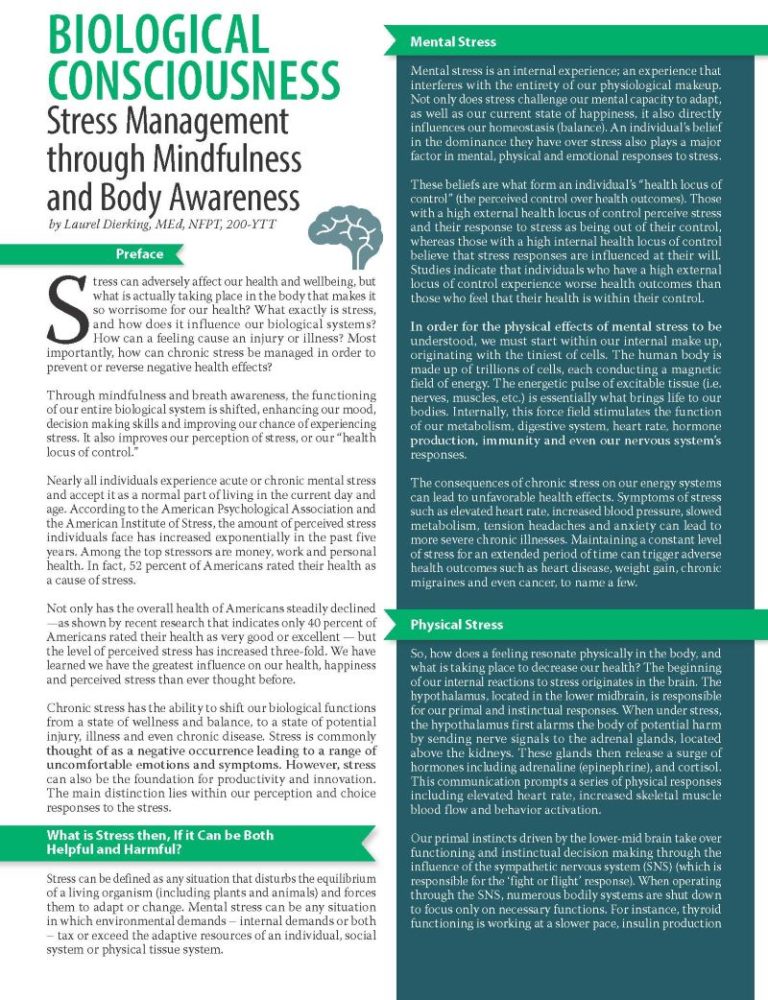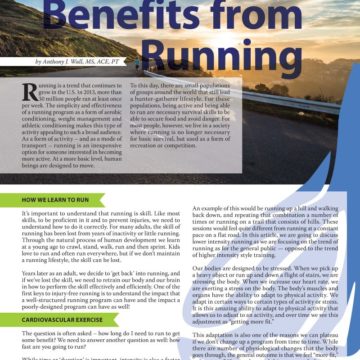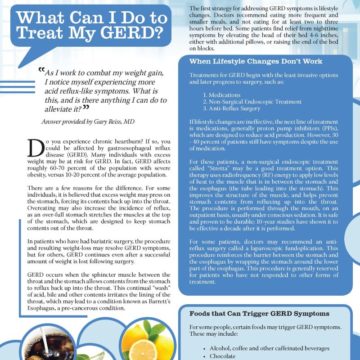Biological Consciousness: Stress Management through Mindfulness and Body Awareness


by Laurel Dierking, MEd, NFPT, 200-YTT
Winter 2016
Stress can adversely affect our health and wellbeing, but what is actually taking place in the body that makes it so worrisome for our health? What exactly is stress, and how does it influence our biological systems? How can a feeling cause an injury or illness? Most importantly, how can chronic stress be managed in order to prevent or reverse negative health effects?
Through mindfulness and breath awareness, the functioning of our entire biological system is shifted, enhancing our mood, decision making skills and improving our chance of experiencing stress. It also improves our perception of stress, or our “health locus of control.”
Nearly all individuals experience acute or chronic mental stress and accept it as a normal part of living in the current day and age. According to the American Psychological Association and the American Institute of Stress, the amount of perceived stress individuals face has increased exponentially in the past five years. Among the top stressors are money, work and personal health. In fact, 52 percent of Americans rated their health as a cause of stress.
Not only has the overall health of Americans steadily declined —as shown by recent research that indicates only 40 percent of Americans rated their health as very good or excellent — but the level of perceived stress has increased three-fold. We have learned we have the greatest influence on our health, happiness and perceived stress than ever thought before.
Chronic stress has the ability to shift our biological functions from a state of wellness and balance, to a state of potential injury, illness and even chronic disease. Stress is commonly thought of as a negative occurrence leading to a range of uncomfortable emotions and symptoms. However, stress can also be the foundation for productivity and innovation. The main distinction lies within our perception and choice responses to the stress.
What is Stress then, If it Can be Both Helpful and Harmful?
Stress can be defined as any situation that disturbs the equilibrium of a living organism (including plants and animals) and forces them to adapt or change. Mental stress can be any situation in which environmental demands – internal demands or both – tax or exceed the adaptive resources of an individual, social system or physical tissue system.
Mental Stress
Mental stress is an internal experience; an experience that interferes with the entirety of our physiological makeup. Not only does stress challenge our mental capacity to adapt, as well as our current state of happiness, it also directly influences our homeostasis (balance). An individual’s belief in the dominance they have over stress also plays a major factor in mental, physical and emotional responses to stress.
These beliefs are what form an individual’s “health locus of control” (the perceived control over health outcomes). Those with a high external health locus of control perceive stress and their response to stress as being out of their control, whereas those with a high internal health locus of control believe that stress responses are influenced at their will. Studies indicate that individuals who have a high external locus of control experience worse health outcomes than those who feel that their health is within their control.
In order for the physical effects of mental stress to be understood, we must start within our internal make up, originating with the tiniest of cells. The human body is made up of trillions of cells, each conducting a magnetic field of energy. The energetic pulse of excitable tissue (i.e. nerves, muscles, etc.) is essentially what brings life to our bodies. Internally, this force field stimulates the function of our metabolism, digestive system, heart rate, hormone production, immunity and even our nervous system’s responses.
The consequences of chronic stress on our energy systems can lead to unfavorable health effects. Symptoms of stress such as elevated heart rate, increased blood pressure, slowed metabolism, tension headaches and anxiety can lead to more severe chronic illnesses. Maintaining a constant level of stress for an extended period of time can trigger adverse health outcomes such as heart disease, weight gain, chronic migraines and even cancer, to name a few.
Physical Stress
So, how does a feeling resonate physically in the body, and what is taking place to decrease our health? The beginning of our internal reactions to stress originates in the brain. The hypothalamus, located in the lower midbrain, is responsible for our primal and instinctual responses. When under stress, the hypothalamus first alarms the body of potential harm by sending nerve signals to the adrenal glands, located above the kidneys. These glands then release a surge of hormones including adrenaline (epinephrine), and cortisol. This communication prompts a series of physical responses including elevated heart rate, increased skeletal muscle blood flow and behavior activation.
Our primal instincts driven by the lower-mid brain take over functioning and instinctual decision making through the influence of the sympathetic nervous system (SNS) (which is responsible for the ‘fight or flight’ response). When operating through the SNS, numerous bodily systems are shut down to focus only on necessary functions. For instance, thyroid functioning is working at a slower pace, insulin production is decreased and blood flow to the digestive system is less, resulting in slower metabolism and reduced nutritional intake. When cortisol is being released during this state, fat storage is increased in order to ensure survival.
This phenomenon is a factor contributing to the current epidemic of obesity. In females, stress has also been linked with the disruption of the normal menstrual cycle. Prolonged exposure to stress can lead to severe sexual malfunction including the inability to ovulate, menstrual irregularities, infertility and the complete impairment of reproductive functions.
Managing Your Stress with Mindfulness
So, how can stress be managed, reduced or even eliminated, in order to reverse or halt the harmful effects of it? The power to influence your reactions to stress and build resilience can be achieved through mindfulness, self-awareness, acknowledging our own intuitive guidance system and practicing stress management techniques such as yoga and meditation, amongst others. Mind and body awareness allows individuals to influence their susceptibility to stress or trauma on the physical body.
Understanding and expanding our health locus of control by challenging negative thoughts has long been used to decrease stress and improve quality of life. Fortunately, mindful awareness can be practiced and learned no matter where you are in your current state of stress! In this context, mindfulness refers in part to the heightened awareness of an outside stress as the first step toward relaxing, in a way that can minimize the effects of that stress on the body.
Practicing Breath Awareness
The foundation for a healthier condition of living can be achieved most readily through breath awareness. Simply taking the time to breathe with awareness has the power to shift our functioning from the SNS to the parasympathetic nervous system (PNS), the system responsible for the ‘rest and digest’ activity within the body. When in this state, the body is able to restore its normal function, which stops the production of stress hormones, lowers blood pressure, increases lung capacity and calms the nervous system.
The taxing demands of our environment make it difficult to believe that something as simple as breath focus can influence so powerfully our state of mind. However, breath awareness and meditation are some of the most solid tools available to conquer stress. Mindfulness involves stopping, paying attention and becoming aware of the present moment’s realities in a non-judgmental way.
Practicing deep breathing improves blood flow to the intuitive prefrontal cortex of the brain, thereby enhancing your mood and decision making skills instantaneously. When we are able to think more clearly, and reroute our energy in a positive direction, we experience the power of our own mental capacity and are offered a moment to choose a reaction to a given situation. This simple practice is unfortunately underutilized, even though it is available to everyone, every day. The self-awareness found in the breath offers opportunities for reflection, contemplation, and guidance towards our own moral compass. When we’re self-aware, we understand the role we play in choosing our perceptions, and the deliberate creation of our own reality.
As we learn to shift our focus to what is under our control, rather than what is not, we enhance our internal health locus of control. This empowering shift reveals the choice we have concerning how long we decide to be confined by the emotional effects of stress, and is also determines the severity of our biological responses to the stress. Breath is the optimal place to begin when cultivating a greater sense of self, because it brings your mind into the present moment and away from fear of the future. Accompanied with exercise, positive social circles and nutritionally balanced diets, mindfulness fosters a greater quality of life.
Conclusion:
The connection between stress and the onset or manifestation of physical ailments has more recently been accepted in Western culture. By expanding our health locus of control, the biological responses to stress and our influence of these responses through mindful breath awareness can significantly reduce our risks for the adverse health effects of stress. However, stress need not be present in order to increase your quality of life through mindfulness.
Mindfulness, mediation, a healthy active lifestyle and compassion for yourself encourages a joyful experience in life, and can be practiced during even the busiest times in your life. We are in control of how we perceive and respond to situations, and by practicing the shift of our focus from negative to positive while remaining in the present moment, we’ll see our lives be enriched through the power of choice with happiness beyond our greatest expectations.
Namaste.
About the Author:
Working within the health field for five years, Laurel Dierking MEd, NFPT, YYT-200, is passionate about cultivating body, mind and spirit awareness through holistic health practices. As a health and fitness professional and yoga instructor at JKFITNESS, Ms. Dierking strives to guide individuals on a path to self-awareness, long-term functional fitness and weight- loss management.
by Robyn Pashby, PhD Winter 2024 “No one is ever going to date you if you don’t…
Read Articleby Nina Crowley, PhD, RD (with Inspiration from Shawn Cochran) Winter 2024 Dating, no matter your age,…
Read Articleby Leslie M. Golden, MD, MPH, ABOM Diplomate Winter 2024 The journey to overcoming obesity is a…
Read Article








